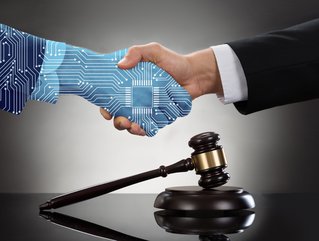How DISCO utilises AI to boost and automate the legal sector

Can you tell me about DISCO, your role and your responsibilities?
DISCO is a cutting-edge legal technology company developing cloud-based legal products backed by AI. I am the Vice President of Machine Learning and Artificial Intelligence. In that role, I coordinate DISCO's technical approach to AI across products and lead a team of researchers and developers that implement our AI methods.
What impact can AI have on the law industry?
At its core, AI allows lawyers to be lawyers. By automating administrative or research-based tasks that don’t require human legal judgement, lawyers can focus on practising law.
Working behind the scenes, AI provides two important services for lawyers. First, AI channels the flood of digital information into comprehensible streams. Supported by AI, lawyers are empowered to keep up with the rapid pace of increase in digital information that lawyers have to review as part of their jobs, including e-mails, spreadsheets, chats, images, video and audio. Second, AI integrates data from diverse sources such as documentary evidence, depositions, legal precedents, regulations and statutes to help lawyers attain a cohesive understanding of the key issues for their clients.
How will AI transform people’s jobs in the future? How has it already changed them now? Can you give some specific examples of the application of AI technology in law?
AI will reduce the burden of low-level tasks, allowing lawyers to focus more on aspects of the case that require their legal judgement and expertise. AI will provide lawyers with a more comprehensive view of the relevant evidence, facts and law, enabling lawyers to give better advice to their clients and pursue desired legal outcomes with greater confidence and success. AI is already transforming legal practice. For example, our AI-powered predictive tagging technology allows clients to review large document corpora with greater accuracy in shorter, more predictable time frames, ultimately reducing costs while improving outcomes.

Why do you think it is important to incorporate AI in law?
Lawyers are required to manage a significant amount of paperwork and documentation, most of which does not require human legal judgement. Through automation, AI reduces the labour of understanding the evidence, facts and law underlying a case.
AI empowers lawyers to work efficiently through the high volumes of documentation involved in legal work today at a speed that older, more standard tools cannot match. Technologies historically used by law firms, such as keyword-based searching, have proven to be substantially less accurate than modern AI methods at finding relevant documents.
Can you talk me through any legal challenges AI can overcome?
When a lawsuit is brought against a company, the company must review its documents for evidence and share all material relevant to the lawsuit, imposing substantial costs that especially impact small and medium-sized businesses. AI can reduce the cost and effort of finding the material that must be shared, reducing business overhead, increasing profits, and ultimately reducing prices for the consumer. AI helps individuals and businesses explore and understand the large amount of relevant documents they may receive during the discovery process.
Do you think COVID has acted as a catalyst for the adoption of this technology in law, if so, why?
I do think that remote work due to COVID has had the effect of increasing the adoption of more advanced AI solutions. The shift to remote work expedited the adoption of cloud infrastructure and other digitisation efforts, giving legal teams access to new, transformative technologies. The pace of AI adoption will only increase as legal teams experience how AI helps them to achieve better legal outcomes for their clients.






